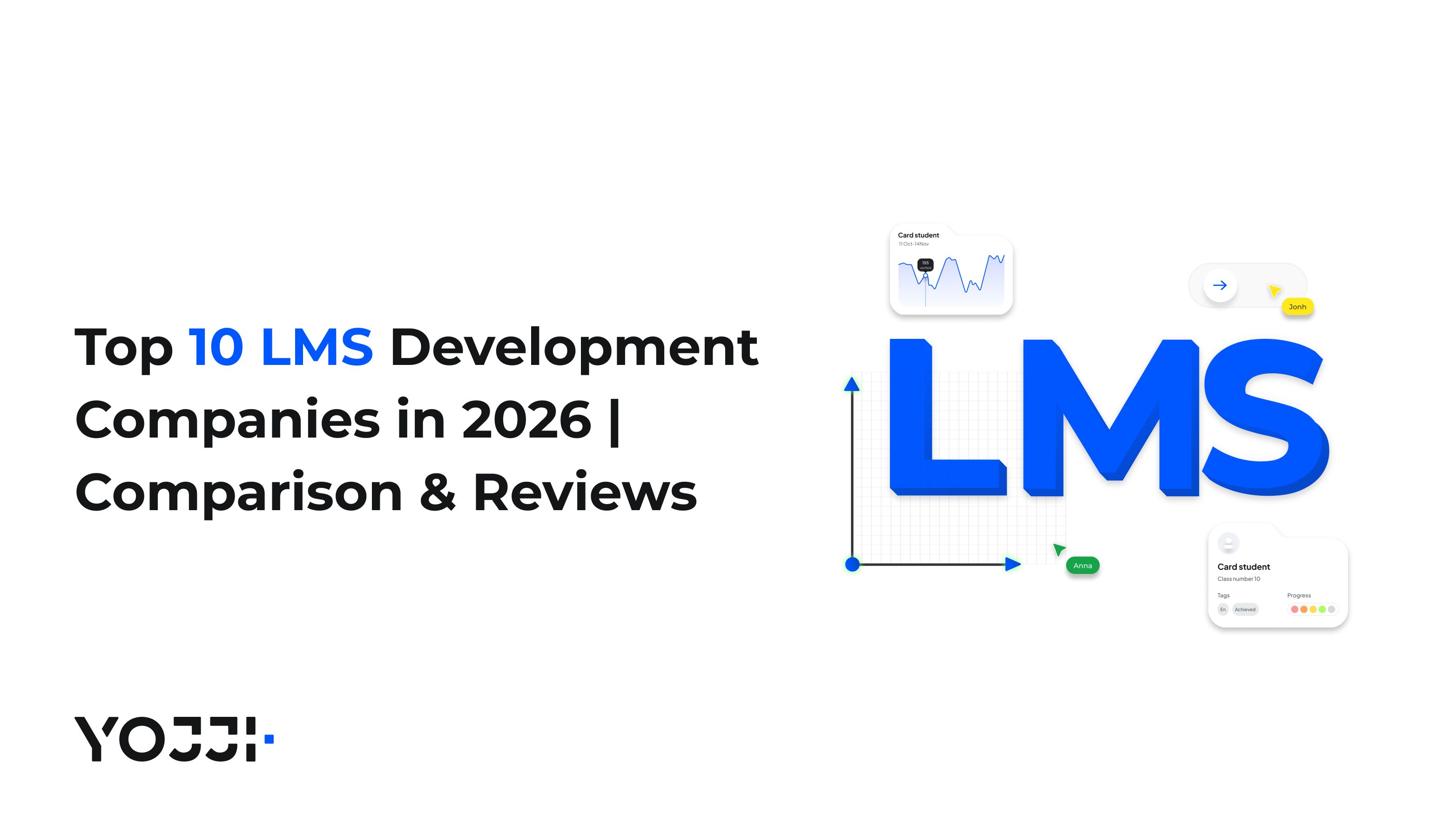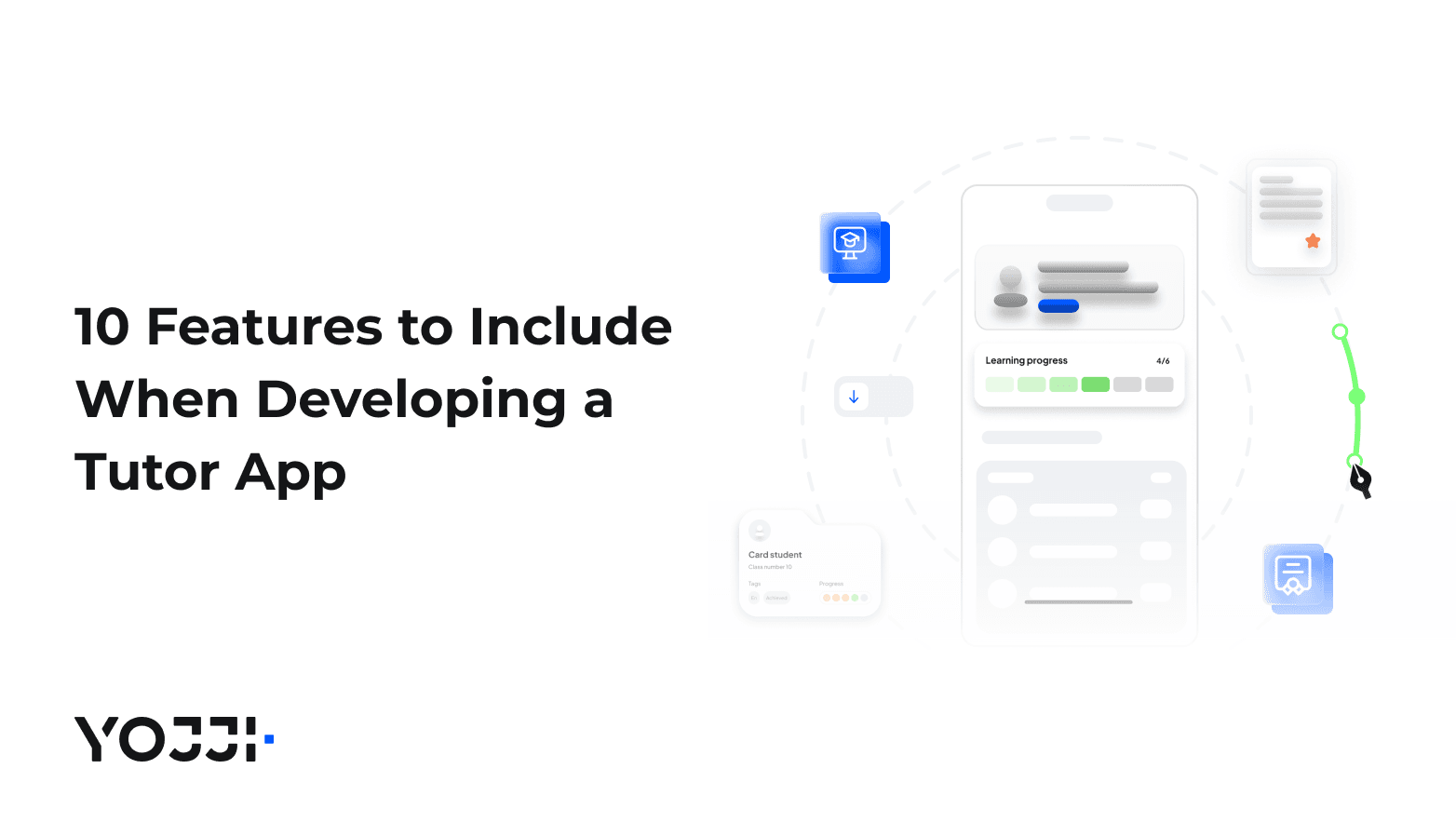AWS vs Azure vs Google Cloud: Complete Guide

According to statistics, since the COVID-19 crisis, the cloud computing market has been on a rapid upward trajectory when it comes to cloud adoption, infrastructure, spending, and development. Also, cloud services have grown to be crucial for many businesses with an informational and technology focus.
Are you going to consolidate your company’s performance resources into one of these platforms? Do you want to find an ideal cloud service for you? Yojji has hands-on experience with cloud platforms, and our team can help you with any challenge your company may have. In this post, we will examine the top three cloud services utilized by millions of users, evaluate their price formation, establishment, security, and tools, and choose the best one among AWS, Azure, and Google Cloud.
AWS vs Azure vs Google Cloud: Establishment
Amazon Web Services
The most experienced and established company in the cloud business is Amazon Web Services. Amazon Web Services, an affiliate of amazon.com, offers a cloud platform to people, businesses, and institutions on a paid-subscription basis. AWS was first made available to the public in 2006. It has a larger user base and more established trust and dependability criteria because it is one of the more established cloud service providers.
Microsoft Azure
In 2010, Microsoft Azure was introduced. The initial goal was to give companies a reliable Cloud Computing platform. As compared to its rivals, Microsoft Azure has made significant progress since its debut.
Google Cloud Platform
The Google Cloud Platform (GCP), a set of cloud computing services that Google provides, employs the same internal architecture as Google’s products, including the Google Search engine, YouTube, and more. In less than ten years after its launch in 2011, Google Cloud Platform has managed to establish a solid foothold in the cloud sector.
AWS vs Azure vs Google Cloud: Availability Zones
The fact that AWS was the pioneer in the field of clouds, it has an advantage in terms of network development. As a result, AWS hosts in many countries throughout the world.
Besides, while both Azure and GCP provide hosting services in several locations throughout the world, they differ in the number of availability zones they offer.
AWS encompasses 99 availability zones across 31 geographic areas worldwide.
There are more than 60 regions in the world where Azure is accessible.
Presently, Google Cloud has 106 zones in operation and a further 27 under development, meaning that the company will have a total of 133 zones existing by the end of 2024.
To fulfill the rising demand for cloud technology, all suppliers continue to broaden their reach by including new locations and zones.
AWS vs Azure vs Google Cloud: Market Shares and Growth Rate
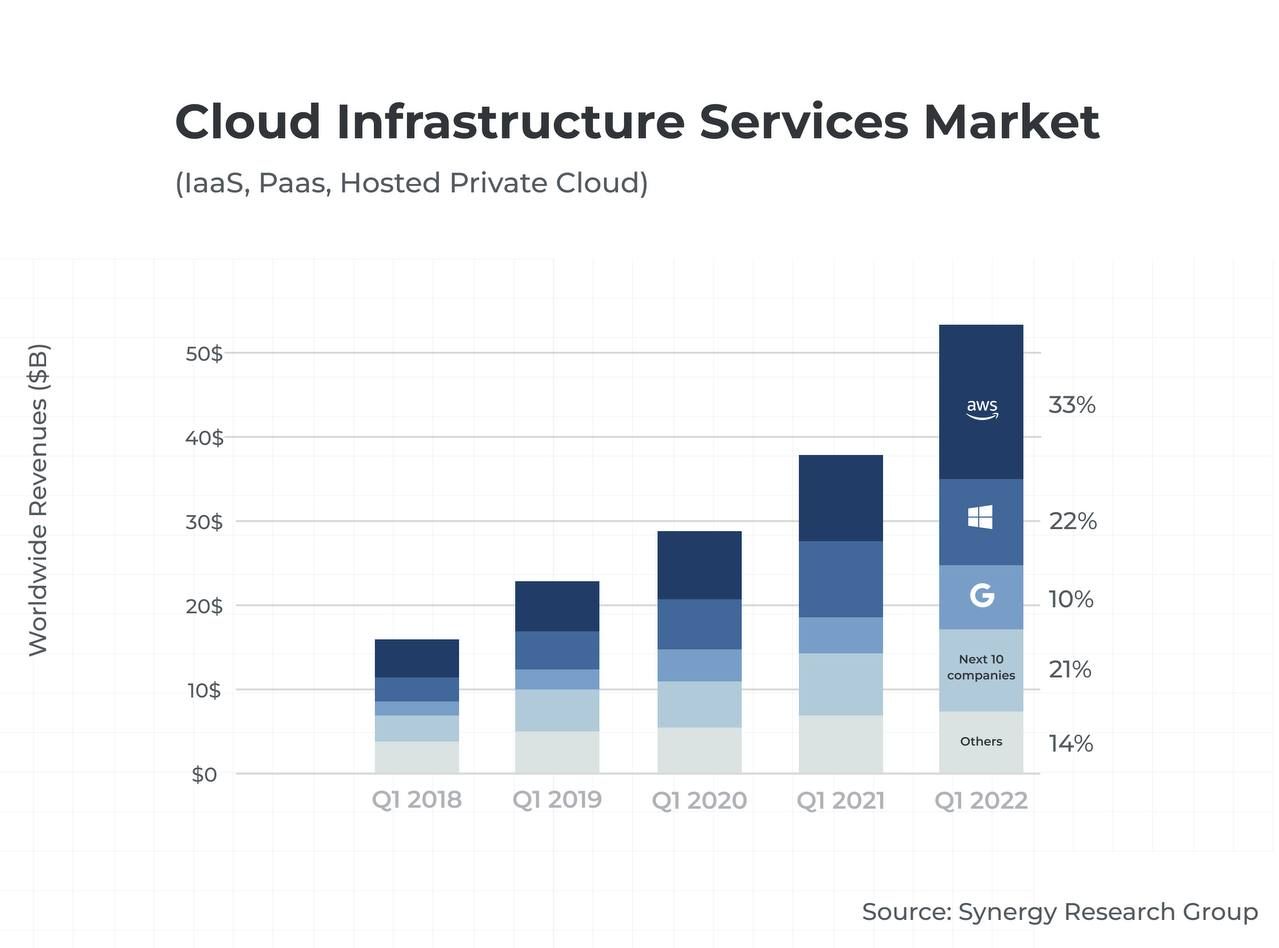
According to statistics, Amazon remains the market leader, with a 33% global market share. Microsoft and Google hold 22% and 10% respectively. According to John Dinsdale, a Chief Analyst at Synergy Research Group, “Amazon, Microsoft, and Google continue to grow at 35-50% per year.”
AWS vs Azure vs Google Cloud: Who Uses Them?
AWS has a larger user base and community support than any other player in the cloud industry. As a result, AWS has more well-known and high-profile clients, like Netflix, BMW, Airbnb, Samsung, Zynga, and others.
Over time, Azure is also picking up its fair share of well-known clients. Nowadays, Polycom, HP, Fujifilm, Apple, etc. are a few of its top clients. However, since Google uses the same infrastructure as YouTube and Google Search, many high-end businesses have confidence in Google Cloud. Some of Google Cloud’s biggest customers are Bloomberg, PayPal, 20th Century Fox, and more.
AWS vs Azure vs Google Cloud Security
When it comes to storing information in the cloud, Microsoft and Google are renowned for their high degree of security. Azure currently boasts the best level of security out of the three cloud computing platforms we’ve listed. It meets more than 90 quality standards across 50 global locations.
Three methods are used to reach this high degree of security:
- Using an integrated cloud platform architecture that offers default security.
- Access to security services and solutions that may be adjusted to safeguard individual apps and data provides security in the cloud platform.
- Security everywhere: It has increased security capabilities outside of the cloud platform to safeguard user assets wherever they may be.
AWS vs Azure vs Google Cloud: Services
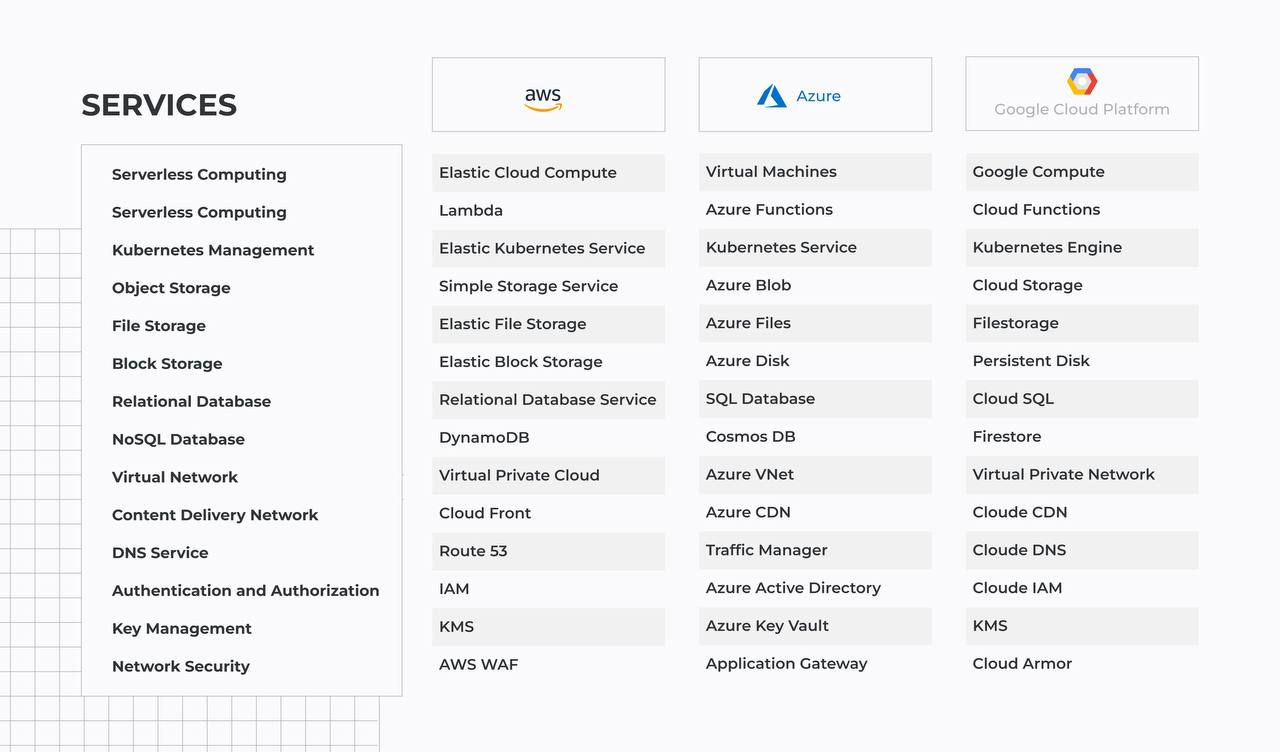
The main difference between the three cloud platforms is the number of services offered.
Most services are provided to clients by Amazon Web Services (over 200 services). Google Cloud and Microsoft Azure each provide roughly 100 and 200 services. AWS has the most services since it was the first to join the industry. It provides various types of infrastructure as a service (IaaS), including networking, storage, database, and computation. Some of Azure’s services include computing, data management, and networking. Another great option is the Google Cloud Platform, which offers payment configuration flexibility, privacy, and traffic security.
AWS vs Azure vs Google Cloud: Key Cloud Tools
AWS Key Tools
AI and machine learning
Amazon provides DeepLens, an AI-powered camera for creating and implementing machine learning algorithms for the image or object detection. Gluon, an open-source deep learning library, enables people to swiftly construct neural networks without any prior AI expertise.
Severless to SageMaker
SageMaker is used to train and develop machine learning models, which is another type of AWS service. Amazon Greengrass IoT messaging, Lambda serverless computing and Alexa services are all powered by the Lex conversational interface.
Azure Key Tools
Cognitive Services
Microsoft provides machine learning and a bot service on Azure and has made significant investments in AI and machine learning. In addition, it offers cognitive services: Text Analytics API, Computer Vision API, Face API, and Custom Vision Service. Moreover, Microsoft provides various management and analytics services for IoT.
Microsoft Software Support
Microsoft on-premises applications may be supported by some Azure solutions. For instance, Azure Backup or Visual Studio.
Google Cloud Key Tools
IoT to Serverless
Google Cloud offers APIs for natural language, voice, translation, and other cutting-edge technologies. It also provides serverless and IoT services.
Incredible AI
Google Cloud is at the forefront of AI development. For instance, TensorFlow is an open-source software library for developing machine learning applications.

AWS vs Azure vs Google Cloud: Hybrid and Multi-Cloud Options
The best cloud solution for most businesses combines public and private clouds. A hybrid cloud enables you to integrate a private cloud, current infrastructure, and one or more public clouds. It is a popular choice among businesses that have already spent a lot of money on IT infrastructure since it is essentially a mix of settings where you may execute applications.
Employing a variety of storage, computing, and service environments is advantageous for a business. With the hybrid cloud, there is explicit cooperation between the multiple platforms.
- AWS hybrid and multi-cloud
Amazon ECS Anywhere
AWS Snowball
AWS Snowcone
AWS Outposts
AWS Local Zones
VMware Cloud on AWS
AWS Wavelength
Amazon EKS Anywhere
AWS Snowcone
- Azure hybrid and multi-cloud
Azure Arc
Azure Backup
Azure Active Directory
Azure Security Center
Azure Blob Storage
Azure Stack
Azure Centinel
- Google cloud hybrid and multi-cloud
Anthos
Traffic Director
Looker
Cloud Build
Operations
Cloud Run for Anthos
AWS vs Azure vs Google Cloud: Pricing
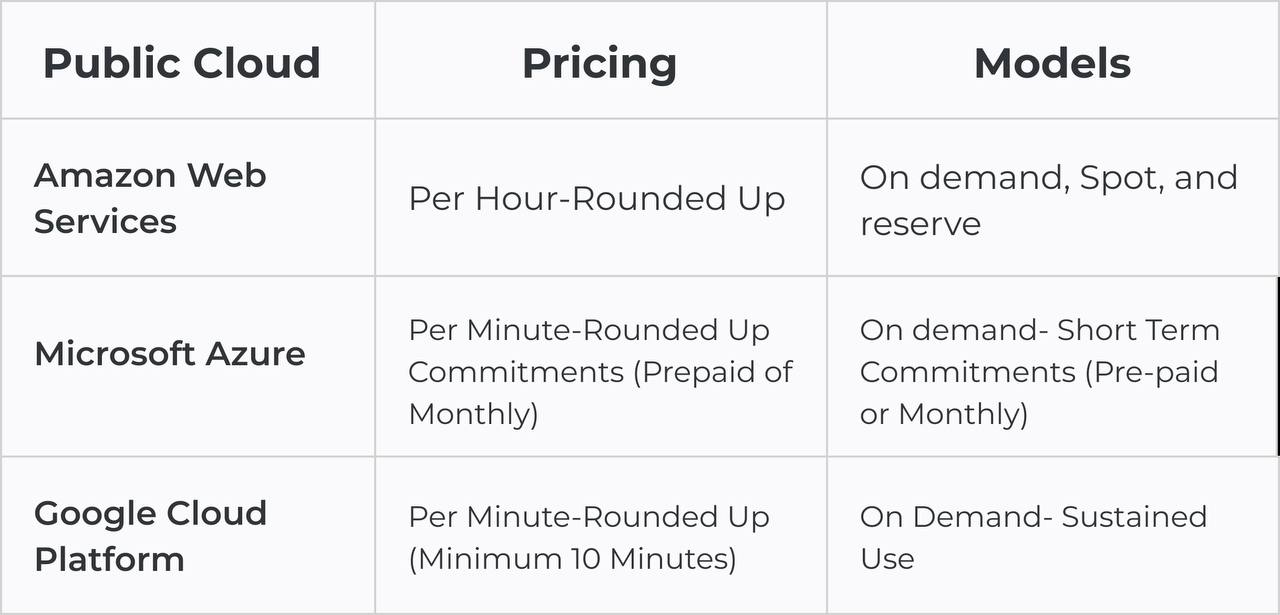
Each platform also offers a free trial version that you may use to test it out. In the meantime, these clouds have several pricing strategies for utilizing the services.
Various payment methods exist for using AWS:
The first option involves paying for the resources you utilize.
The second option means that you should double-check the supplies and services you plan to order. Customers receive a one- to three-year advance before being charged based on their consumption after that. Note that you pay less if you use a wider range of services.
The fee for Amazon Web Services is rounded up for each hour of use.
Microsoft Azure has a unique method of price formation. Provider resources are billed rounded up for every minute. Depending on how many services are used, discounts are offered. GCP operates on essentially the same principles as Azure. An exception is that the final payment is rounded up or down every ten minutes of use.
AWS vs Azure vs Google Cloud: Pros and Cons
AWS: Pros and Cons
Pros
- With the most compliance certificates, Amazon is one of the most reputable service providers.
- Its operations span a vast area and are supported by an extensive global network of data centers.
- AWS has emerged as the most developed and enterprise-ready service due to its simplicity in offering scalability and comprehensive security.
- AWS gives apps flexibility and speed. In addition, a simple setup procedure makes it possible for an application to be deployed quickly, increasing agility and efficiency while cutting down on time and costs.
- It offers excellent and trustworthy client service.
- AWS offers a remarkably broad range of tools and services.
Cons
- The pricing strategy is incomprehensible to customers.
- The availability of the Internet is necessary for AWS.
- Although reliable and well-designed, cloud computing services can occasionally experience technical difficulties.
Microsoft Azure: Pros and Cons
Pros
- It offers large savings on service contracts to its clients.
- Compliance certifications, combined with robust cybersecurity safeguards, make Azure a market leader in IaaS security.
- Azure makes it simple to scale computing power.
Cons
- A high level of skill is necessary to operate Azure.
Google Cloud: Pros and Cons
Pros
- It has extensive scalability and load-balancing capabilities.
- The platform specializes in high-computation solutions like big data, analytics, and machine learning.
- During maintenance events, virtual machine live migrations are possible.
- Google Cloud provides four data backups.
Cons
- Compared to its competitors, GCP has fewer worldwide data centers.
- GCP’s support could be better.
- The rate of innovation is not very high.
- The customization possibilities for GCP solutions are quite limited.
Conclusion
Even though AWS is the market leader in storage and services, Microsoft Azure and Google Cloud are rapidly expanding to compete with AWS. Of course, the choice of a cloud platform depends on your specific use case. As the market evolves, most firms are looking for multi-cloud solutions that allow them to reap the benefits of each cloud provider without being locked into a single one. If you need professional assistance, you can contact Yojji. Our top-notch professionals will help you expand your business.
Looking to hire developers?

